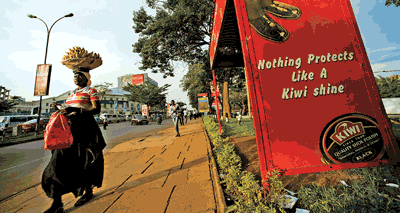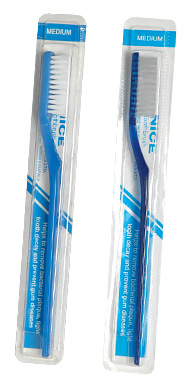
Chinese Counterfeiters Thrive in Africa
In Africa, no consumer product seems too small or too cheap to be targeted by Chinese counterfeiters
by David Rocks and Alex Halperin
source:
Business Week
A few years ago, consumer products giant Sara Lee (SLE) started seeing knockoffs of its biggest seller in Africa, Kiwi shoe polish. The company fought back by updating the Kiwi label, but the counterfeiters quickly matched it. So Sara Lee introduced new packaging sizes. A half-year later the fakes were showing up in the new sizes. Then the company changed the mold to give the Kiwi tins a deeper rim, but counterfeiters soon had nearly identical ones on the market. "Every time we change something, their lead time gets shorter and shorter," says Joab Ouma, who at the time was Sara Lee's marketing director for East Africa and now works independently as the company's distributor in Uganda. "First it was six months, and now it's as little as six weeks."
The focus of this game of cat-and-mouse: shoe polish that retails for as little as 35 cents per tin. Kiwi is far and away the biggest shoe polish brand on the continent, with overall sales of more than $50 million and perhaps 80% market share. But in Uganda and some other countries roughly half the "Kiwi" for sale is fake, cutting Sara Lee's shoe polish sales by about 20% across the continent. "The biggest competitor we have is our own brand," Ouma says.
Forget knockoff Rolexes, ersatz Louis Vuitton handbags, and fake Viagra. Chinese counterfeiters targeting Africa head directly for the bottom of the market. Low-end, high-volume goods such as ballpoint pens selling for a dime, tiny packages of soap or deodorant, and Kiwi shoe polish (a surprisingly big business in Africa, where people often keep shoes for years, shining them fastidiously) are all prime targets for China's legions of factories making knockoffs. Kiwi has closed factories in Malawi and Zambia, and a plant making BiC pens has shut down in Mozambique—all in part because of piracy.
It's easy to see why the fakers like Africa. While they're happy to sell obvious knockoffs, it's far better for them if they can sneak their products into the legitimate retail-sales chain and fetch full price. Nowhere is that easier than in sub-Saharan Africa, where the vast majority of sales are rung up in tiny cinderblock storefronts or kiosks thrown together from scrap wood. While the few big chains keep suppliers on a tighter rein, Africa's hundreds of thousands of small merchants buy their wares from the cheapest source they can find. The Uganda National Bureau of Standards estimates that nearly a third of consumer goods sold in the country could be fake.

And the counterfeiters can make money, even with items that sell for pennies. Kampala-based Nice House of Plastics makes toothbrushes sold only in Uganda and neighboring countries. These days, it's shipping fewer than 800,000 brushes monthly, down from about 2 million before Chinese manufacturers started copying them two years ago. "People used to use tree branches to brush their teeth, but as they get more money they're buying toothbrushes, so sales should be growing," says James Mulwana, managing director of Nice. Although the retail price of a Nice brush is just 20 cents, and Mulwana makes less than 2 cents profit on each sale, the counterfeiters' margins are higher because they don't have any advertising or marketing costs. "Once the Chinese find that your product is selling, they'll copy it," he says.
It helps that the counterfeiters make really good copies. The faux Nice toothbrushes come in a plastic blister pack that's virtually indistinguishable from Nice's packaging, except that the knockoffs say "Design in Germany" while the real ones say "Made in Uganda." In Nairobi, Haco Industries manufactures BiC pens under license. Haco has seen pens fall from 90% of its $25 million in annual sales to just 50% as the market has been inundated with fakes that even company executives have difficulty telling from the genuine article. Haco Managing Director Polycarp Igathe takes one of the copies and smashes it against the glass top of his desk, but it doesn't break. "This is bloody good," he says, examining the unbruised pen. "They are getting better every day."
African governments realize they have a problem, but they have a hard time fixing it. "Protection of intellectual property rights in developing countries...is a new thing," says Wycliffe Swanya of the Kenya Association of Manufacturers. Kenya and Uganda have floated anti-counterfeit legislation, but the measures haven't passed yet. Even if they become law, inexpensive consumer goods won't likely be a top priority. "The authorities say, 'If we have to go after either someone selling counterfeit drugs or someone selling fake shoe polish, the choice is clear,'" Ouma says.
That means brand owners are left to fight the problem on their own. Sara Lee, Nice, Haco, and others often sue importers of counterfeits under a hodgepodge of existing regulations. But those outfits tend to be shell companies that fold after bringing in just one or two shipments, making it tough to find the owners. Sara Lee has found dozens of factories in China that counterfeit its products, and says it has made progress in fighting the problem. But while Sara Lee can sometimes impound the goods it finds, it's much harder to seize manufacturing equipment. "Have we really shut them down? No," says Sander Bakker, a Sara Lee anti-counterfeit executive. At the Canton Fair, a twice-yearly confab in the Chinese city of Guangzhou, Bakker says he has seen catalogs from counterfeiters offering products masquerading as various global brands.
As for the product itself, Sara Lee says the counterfeiters take shortcuts that make for inferior polish. They use kerosene, while real Kiwi is based on a more refined petroleum byproduct called white spirits, which Sara Lee says better protects shoes. Ouma sniffs a tin of fake Kiwi and turns up his nose, but a less discriminating sniffer can't discern a difference.
At Haco, meanwhile, workers pour plastics through injection molds to form the components of a BiC. Other employees assemble pens by hand and sort them into boxes for shipping. Can Haco keep providing those jobs? Igathe says the counterfeiting might eventually force the company to outsource its production to China. "It's a real question in our strategic plan," he says. "But it would make me bleed."
